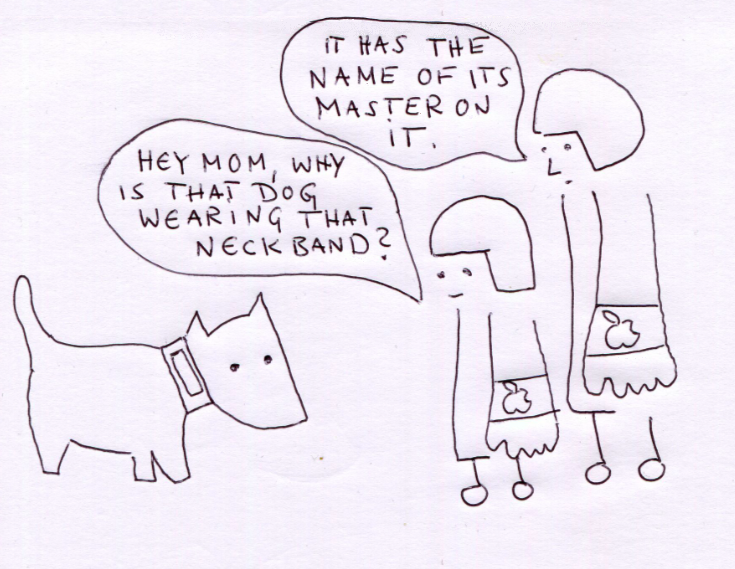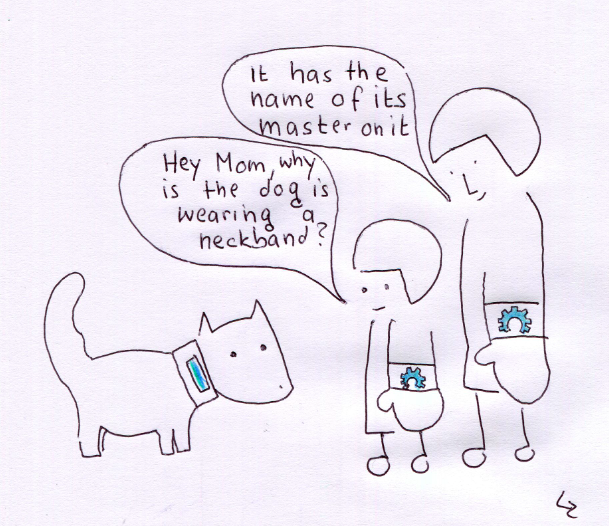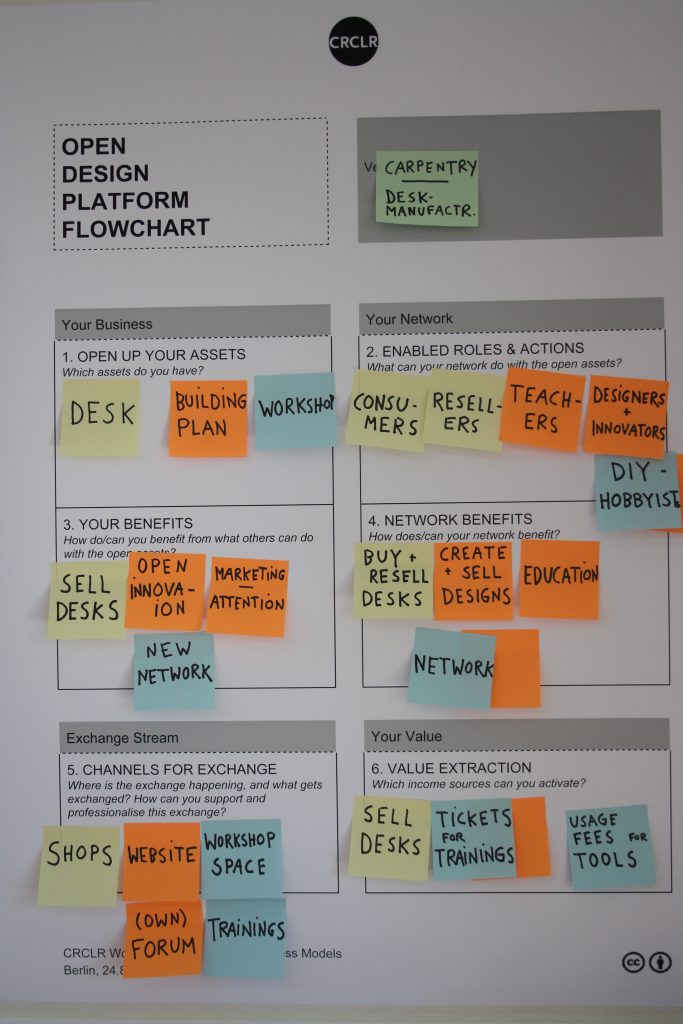Hello
Intro: This Talk
ANASTASIA PISTOFIDOU: Hello Lars! How are you? […] I’d like to transmit to my fabricademy students the value of open source and the fact that it is the only way if we want to change the world. […] The course is distributed and open source, you can find all of our classes and lectures here: https://class.textile-academy.org/ […]
LARS: Sure. Let’s do it!
Form
This website is my presentation. I’ll scroll through it and click on links. The page is public on the web so you can click it too after or during the talk. The url is: opencircularity.info/fabricademy
For this video-streamed talk it might actually be easier if you scroll through the topic yourself … So I can disable the screen-sharing mode and you’ll have a richer experience: Slides + Face.
Let’s go!
Value Of Open Source
I think Anastasia watched with you this short 10 minute video of me explaining why Open Source is potentially the key to make a sustainable economy in a free world happen.
It’s a good introduction.
But I’d like to expand this a bit. I was thinking about how to answer Anastasias request and then I remembered that in 2014 I published a series of blogposts on Open Source Hardware & Freedom. I will go with you through these texts today.
And in the end I will talk about how to design products to work for business as open source.
But let’s start with the question: What is Open Source?
I. What is Open Source?
Definition of Open Source Hardware
How does this look? Some Images?
Web Image Search for: Open Source Hardware
Web Image Search for: Open Source Furniture
Web Image Search for: Open Source Robotic
Web Image Search for: Open Source Cars
… There is almost no area where no one tries to go the Open Source road.
2. Open Source Hardware & Freedom
Ok. Let’s go through the 6 blogposts on Open Source Hardware & Freedom. Sometimes I will highlight ideas specifically mentioned in the post sometimes I will just talk about related ones.
Post 1: To Control Your Technology
- „Open source hardware gives people the freedom to control their technology…“ (OSHW-Definition)
- If something is closed you can’t be sure that it is not working against you behind your back (surveillance – what is FB doing with your data? Who is Alexa talking to? What is the “smart” city really doing? …, planned obsolescence)
- “Security through obscurity” is a problematic concept
→ If things are open is is (easier) possible to make sure they work like you want them too!
CORY DOCTOROW QUOTES:
“How do you make DRM work? Effectively to make DRM work you have to have an anti-feature in your device. Your beautiful device with the glowing apple on the front of it has to watch what you do and wait for you to do something that you are not supposed to, like install software that didn’t come from the apple store. And than some process that has been lurking in the device unbeknownst to you has to float up to the surface and say instead of “Yes Master” it has do say “I can’t let you do that Dave”.”
“There is no way to fight oppression without free devices and free networks.” Cory Doctorow (Author)“
Images at the end of my post:
Post 2: Problems With “Non-Commercial” & “Not-For-Profit”
- Open Source allows commercial use! For anyone.
FROM THE OPEN SOURCE HARDWARE DEFINITION
“7. No Discrimination Against Persons or Groups
The license must not discriminate against any person or group of persons.
8. No Discrimination Against Fields of Endeavor
The license must not restrict anyone from making use of the work (including manufactured hardware) in a specific field of endeavor. For example, it must not restrict the hardware from being used in a business, or from being used in nuclear research.”
- No discrimination of anyone! Not even weapon manufacturers. Is this really good?
- Well … Michel Bauwens has an idea how to do good in the world. He calls it “Commons Based Reciprocity License”. Two quotes from that text:
MICHEL BAUWENS
„Unlike for-profits, the new cooperatives must work for the common good, a requirement that must be included in their own statutes and governance documents.“
“The key rules of such licenses are: 1) the commons are open to non-commercial usage 2) the commons are open to common good institutions 3) the commons are open to for-profit enterprises who contribute to the commons. The exception introduced here is that for-profit companies that do not contribute to the commons have to pay for the use of the license.”
What is the problem?
- There is this idea that “for-profit” is the opposite of “common good”. Who decides what is “for profit”? Who decides what is the “common good?” This is super hard to define. Imagine someone saying: “Bubble gum is something that is not really needed, that creates problematic waste and is not good for the commons – it is not good! It is a useless capitalistic luxury! It should be forbidden.” True! Right? Well … maybe there is someone with a strange mandible disease who really needs bubble gum to stay healthy … “All animals are equal, but some animals are more equal than others” (George Orwell, Animal Farm)
- The last quote: “for-profit companies that do not contribute to the commons have to pay for the use of the license.” A poor fisherman can use an open machine but he is probably to busy to produce new ideas for the commons … he has to pay! A large corporation can easily invest a couple of hundred EUR to create and share an invention. And can use all the other building plans for free after that!
→ If you introduce a binary differentiation (for profit/not for profit | common good / ‘common bad’) it will always lead to discrimination!
→ OSHW does not decide what is good or bad in use cases or users. It creates (and distributes) opportunity. For (potentially) everyone.
→ Therefore you might think, it is a great tool for democracy/within democracies?
Post 6: Ideology Of Liberalism
We jump here to Post No 6 which says that I learned something from Michel Bauwens: Open Source Hardware is not “ideology free” but follows the ideology of liberalism!
WIKIPEDIA ON LIBERALISM
“Liberalism is a political and moral philosophy based on liberty and equality. Liberals espouse a wide array of views depending on their understanding of these principles, but they generally support civil rights, democracy, secularism, gender equality, racial equality, internationalism, freedom of speech, freedom of the press, freedom of religion, and free markets.” (CC-BY-SA 3.0, Wikipedia)
–
QUOTE FROM THE ARTICLE
“According to Wikipedia Liberalism is one of the three big political ideologies, conservatism & socialism are the two others. And this means that it has an idea of freedom that is not the only one and therefore not necessarily the right or a neutral one.”
–
That’s what you should be aware. If you like OSHW – you are part of a certain ideology.
Post 3: Sustainability & Global Equality
We have covered this to some extend already in the video above on Open Source Circular Economy. But for me this is the most interesting part so I repeat it by quoting the article on the sustainability part:
QUOTE FROM THE ARTICLE
“With public building plans things can become more long-lasting because it is easier to repair them or reuse/repurpose (hack) them or to add new features to them. Open objects tend to educate people and allow them to build deeper connections to their environment – to engage responsibly, caring and creative with the things and structures around them. If it is transparent how something was made, it becomes easier to recycle it. This means open source can provide us with the possibilities to develop step by step a zero waste economy with closed material cycles. We can design and organize our products and production processes regenerative and become more resilient.”
–
What says to post about global equality? Two things:
- If the technology is open it could help developing countries to make faster progress with catching up.
- And it talks about resource wars: Open Source could help to save our resources (by putting them into cycles). Therefor there would be enough for everyone and no one would have to invade other countries (by gunfire or capital) to get the resources there.
QUOTE
“Circular Economy is an economy where we don’t have to invade other countries and shoot little children to get our hands on resources. Because we use our resources in a way that there is enough for all …”
–
Freedoms! The post lists a lot of freedoms in the end. I just quote them here:
“Here are some freedoms that pop up in this scenario. They effect each other, yes:
* The freedom not have to buy new stuff all the time.
* The freedom that comes with living in an healthy environment.
* The freedom to be surrounded by objects that openly invite you to redesign them and that assist you with this by being an accessible regenerative resource base to solve your current needs.
* The freedom for some countries and communities to develop themselves better and faster and independently.
* The freedom not to have to live in an iron, highly-surveilled, paranoid fortress in fear of the revenge or penury of those you suppress or shot at for their resources.
* The freedom and possibility to collaborate globally in and for a sustainable economy.”
Post 4: Gender Balance
The post expresses that theoretically Open Source Hardware would enable woman and other underprivileged groups to get their hands on technology because the hurdles to the knowledge and tools are lower.
Although the numbers in the Open Source Hardware Association community survey from 2012 show something different.
But maybe this is just a matter of time? What do you think?
Post 5: My Space To Think & Play
The last post explains why Open Source Hardware is for me as an artist and economist and designer a very interesting field! It brings together so many interesting questions and opportunities and is a field that isn’t really explored … There is a lot of work to do and a lot of things to discover! Many unkown things!
And it gives you the freedom to believe in and work for a better tomorrow.
I like that.
–
Reprise
A couple of weeks I found this. Richard Stallman is the inventor of the free software movement (which later gave birth to the open source movement). He talks a lot about freedom. And there is even a song. The free software song. Let’s hear it:
Join us now and share the software;
You’ll be free, hackers, you’ll be free.
Join us now and share the software;
You’ll be free, hackers, you’ll be free.
Hoarders can get piles of money,
That is true, hackers, that is true.
But they cannot help their neighbors;
That’s not good, hackers, that’s not good.
When we have enough free software
At our call, hackers, at our call,
We’ll kick out those dirty licenses
Ever more, hackers, ever more.
Join us now and share the software;
You’ll be free, hackers, you’ll be free.
Join us now and share the software;
You’ll be free, hackers, you’ll be free.
3 Business Models (= Product Design)
(If there is still time)
How to make business with Open Source (Hardware)?
This is very often (at least in Hardware) a question of the design of the object. You need to design something to work as an open source product business-wise. And this means you have to design it for an open ecosystem or in other words as an open platform!
What this means is explained here in this MOOC on Business Models for Open Source (Circular) Hardware. Please watch the videos there or read the script.
But if we have time I go with you through the core of the MOOC. A tool that helps you to raise the right questions and gain the right perspectives on your product or idea. Let’s go through this slideshow explaining you the tool with the famous open source hardware project Arduino
Starts at slide 68 | Slideshow link
Another (simpler) example
4. 3 → 2 → 3
Ok. And now with that (Nr 3 “Business”) in mind let’s go back to Nr 2 – The Freedom Posts. What do they say – what do they inspire to put into this canvas tool? What roles and actions and ecosystems?
- Gender Equality
- Control Your Technology
- Enable Poor Countries
- Sustainability (Circularity)
5. Thanks
& pls follow me for hands on, campaign and theory-stuff
- on my Newsletter
- or maybe Twitter: @bricktick
- and Facebook
- or if you know how to use RSS on my websites mifactori.de, larszimmermann.de & opencircularity.info


